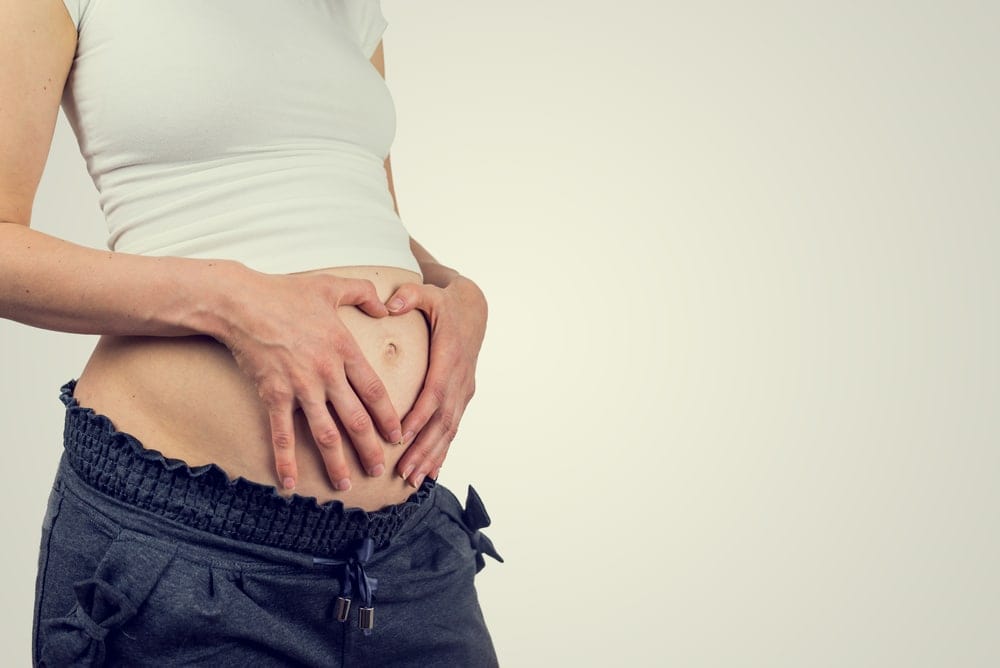13 Weeks Pregnant
Congratulations! The 13th week of pregnancy means you have one week left in your first trimester. Here is what you can expect in the upcoming week. Get the Fetal Life App for Apple and Android endorsed by the American Pregnancy Association.
What changes are occurring with your body during the 13th week of pregnancy?
You may not have begun to wear maternity clothes yet, but you have most likely replaced tight-fitting clothes with more comfortable clothing. Stretch marks may be appearing on your abdomen, breasts, hips, or buttocks. Your morning sickness may begin to subside at this point, but you may be experiencing more frequent heartburn. You may also notice some distinct changes in your breasts. By now your breasts might have become larger and may feel lumpy or nodular, which is caused by the mammary ducts as they begin to prepare for milk production. You may also have noticed veins appearing right under the skin on your breasts. Additionally, colostrum begins to form during the second trimester; this is the first stage of breast milk, and it can be expressed from the nipple when massaged.
What is happening with your baby during the 13th week of pregnancy?
Up until this point, your baby’s head has been the largest part of his/her body, but that is beginning to change. Your baby’s head is now only about 1/3 of his/her body. Unique fingerprints are now located on the tips of your baby’s fingers. The kidney and urinary tract are completely functional, which allows the amniotic fluid your baby has been swallowing to be excreted. Also, covering your baby’s skin is a fine, soft hair called lanugo.
How big is your baby during the 13th week of pregnancy?
By your thirteenth week of pregnancy, your baby is almost 3¾ inches (9.5 centimeters) long and weighs 1¼ ounces (about 35 grams).
What should you plan for the 13th week of pregnancy?
As women finish the first trimester, they may notice an increased libido. It is common for couples to wonder whether sex during pregnancy is safe. Many don’t realize that the baby is protected by the amniotic fluid in the womb, by your abdomen, and by the mucus plug which seals your cervix and helps guard against infection. For many couples, it is safe to engage in sex while pregnant. However, sex should be avoided if:
- You have a history of premature birth or labor.
- You have a history of miscarriage.
- Your water has broken.
- You experience unexplained vaginal bleeding or discharge.
- You have placenta previa or a very low-lying placenta.
- You have an incompetent cervix, or your cervix has dilated.
- You or your partner has a sexually transmitted disease.
Tips for making your pregnancy better
Almost 90% of pregnant women experience stretch marks. Stretch marks appear as pinkish or reddish streaks running down your abdomen and/or breasts. Gaining weight at a slower rate can decrease the chance of stretch marks appearing, and it is also healthier for you and your unborn baby. Exercising and applying lotions that contain vitamin E and alpha hydroxy acids may also help prevent stretch marks. If these do not work for you, take comfort in knowing that stretch marks fade after delivery. Check with your health care provider before using over-the-counter products for treating stretch marks. Some of these creams can be absorbed by the skin and into the mother’s bloodstream, which means they will also pass to the baby.
Tips for mom’s partner
Fill-up mom’s car with gas. This may sound quite simple, but many pregnant women are sensitive to gas fumes. Even if your partner is not one of these, she will probably appreciate your help.






